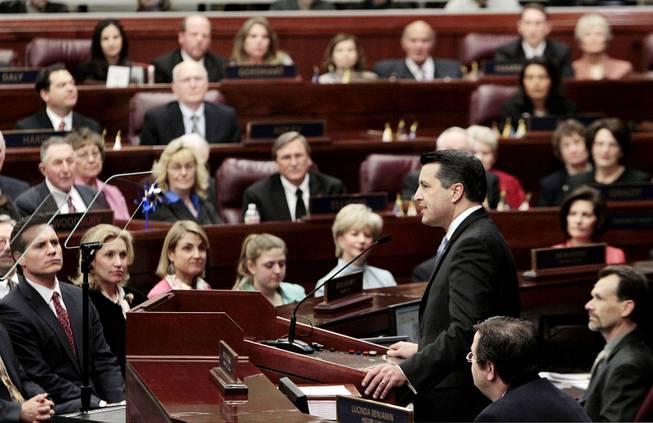
Rich Pedroncelli / associated press
Gov. Brian Sandoval has proposed deep cuts in K-12 and higher education, but no new taxes, in his first budget as governor.
Sunday, March 6, 2011 | 2 a.m.
Sun archives
- UNLV president’s somber warning on budget cuts moves faculty to tears (2-16-2011)
- Higher education officials say Sandoval budget cuts a ‘death sentence’ (2-4-2011)
- Education in forefront of upcoming budget battle (1-30-2011)
- Chancellor: University tuition would have to go up 73 percent to cover Sandoval budget gap (1-27-2011)
- Soft words during State of the State hide Nevada in pain (1-25-2011)
Nevada’s higher education system faces a 20 percent reduction in funding in Gov. Brian Sandoval’s budget. Among the scenarios discussed are closing entire campuses, restricting access for Nevada’s undereducated citizenry and laying off staff.
It falls to lawmakers to decide whether to find more money or carry out the cuts.
That would mean deciding whether to keep colleges open in Elko, Carson City, Las Vegas and Reno. Whether to rescind the colleges’ access-to-all mission and turn away more students. Whether to keep open the state’s dental or medical schools.
Legislators making these decisions will be influenced by their educational backgrounds, although sometimes in surprising ways.
An analysis found two-thirds of the 63 legislators have earned four-year degrees. Forty percent have graduate degrees or higher. That’s a stronger record than Nevada’s population in general. Only 14 percent of Nevadans have bachelor’s degrees, and 7.2 percent have graduate degrees.
Four lawmakers listed no college experience on their legislative bios. Eighteen have attended some college but haven’t earned degrees.
(Sandoval is a graduate of UNR and has a law degree from Ohio State University.)
The point of a part-time Legislature is that its members reflect the life experience of the people they represent. Here’s a look at how four Nevada lawmakers with varying levels of education have approached this year’s higher education budget:
Senate Majority Leader Steven Horsford, D-North Las Vegas
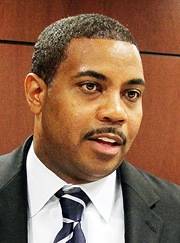
Senate Majority Leader Steven Horsford, D-North Las Vegas
Horsford is fewer than 20 credits shy of completing his bachelor’s degree at UNR — a fact that surprised many in the Legislative Building last week.
“Life happens,” Horsford said last week when explaining what stopped him from finishing his degree.
In Horsford’s case, he had to care for younger siblings in the wake of his father’s murder and his mother’s drug addiction.
But he refused to let go of the rope education provided him for escaping the life that led to his father’s death. He returned to school, working while attending school full time to earn enough for tuition and to help care for his family.
Nearing his degree, but with a full-time job at R&R Partners, Horsford eventually turned to full-time work and figured he’d piece together the final credits from the University of Phoenix and UNR — something he’s still working to accomplish.
“There were times where I had to work to make ends meet for myself and my family, and those circumstances contributed to my inability just to finish up at the time,” he said, adding “it’s a priority to me” to finish.
Horsford sees his struggles reflected in the students who testify before the Finance Committee, begging lawmakers not to close the door on education that would mean a better life for them and their families.
He’s been known to fight through tears to answer them.
“I cannot support a budget that will allow for students to be turned away,” he said last week during a budget hearing.
Horsford has warned the system will have to accept cuts. The state’s financial situation is too dire. His goal is to keep those cuts from interfering with students’ ability to earn degrees.
“I can relate to the fact there are other circumstances that prevent them from focusing 100 percent on their education,” he said. “Despite their best intentions and hopes and dreams to accomplish their goals, life happens, and it prevents them from accomplishing that goal. I can relate.”
Sen. John Lee, D-North Las Vegas
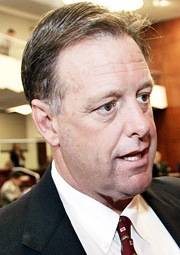
Sen. John Lee, D-North Las Vegas
Lee got married the same week he turned 19. “And I married Fertile Myrtle,” he said, noting that he and his wife had five children before he turned 30.
He enrolled in college courses. But then a job came up. Deciding between earning money and an education, he opted for the income. “I missed that opportunity (to go to school),” he said.
Lee eventually started a plumbing business and a tile company he recently closed.
But he’s emerged in the Legislature as one of the most vocal advocates of the College of Southern Nevada.
Resorting to an overwrought comparison of potential street protests in Las Vegas akin to those in Cairo, Lee argued the state is shorting CSN of funding and essentially robbing blue-collar workers of a path to the middle class.
Lee said he recently laid off “80 guys” who he fears won’t be able to return to manual labor. Cutting CSN funding would prevent them from obtaining the education needed to find new work.
“The world is on fire right now, and this is something that could cause the same sort of uprising” as in Cairo, he said.
Although he didn’t go to college, he said five of his six children have graduated from college.
“I’ve realized education is really key,” he said. “I just know the (job) opportunities I had aren’t there any more.”
Assembly Majority Leader Marcus Conklin, D-Las Vegas
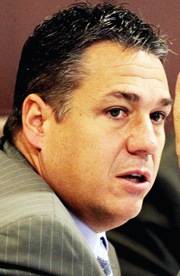
Assembly Majority Leader Marcus Conklin, D-Las Vegas
Conklin completed his second master’s degree less than two years ago. Listening to his line of questioning in committee, it’s hard to miss his subject of study: economics.
“You throw a 20 percent price increase to your four-year institutions, you are going to lose people, period,” he told Chancellor Dan Klaich last week. “The number of people you lose is going to impact your finances. You’ll still have a budget hole. So, what do you do? Raise it again? There is a diminishing return associated with that price increase.”
Conklin said he pursued his degrees because of an interest in the subject (his first degree is in political science) and to improve his professional prospects. “I’m living proof that an education has a positive effect on a life outcome that isn’t just satisfaction on a subject but is financially rewarding,” he said.
Conklin doesn’t have much patience for personal stories of what access to an education can mean for individual students. He’s about using the numbers to back up the policy.
“Set aside the social issue of who gets an education and who doesn’t,” he said during a hearing last week. “Have you examined the true financials?”
Sen. Barbara Cegavske, R-Las Vegas
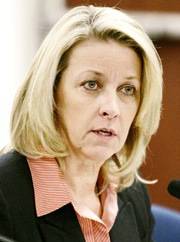
Sen. Barbara Cegavske, R-Las Vegas
Cegavske has had a love-hate relationship with higher education.
She’s taken community college courses but as a wife and mother, she said she never seriously set out to earn a degree. Some of her five siblings have finished college. Her father finished eighth grade and was told never to go to college, she said.
“I value education, but it was my choice to have a family,” she said.
Cegavske has had sharp words for higher education officials, chastising them for their audacity to request a funding increase to keep the system whole when the state is faced with a $2 billion deficit.
“It was a stick in the eye,” she said.
But Cegavske describes herself as a “huge fan” of Nevada’s community colleges. “I believe they are the stepchild (of the university system) and they shouldn’t be,” she said in a budget hearing last week.
If higher education has a role in diversifying Nevada’s economy and pulling the state out of recession, Cegavske says it lies with community colleges.
“They are the catalyst to getting this whole economic development thing going,” she said. “They teach the trades, the hands-on things that students are yelling for.”

Join the Discussion:
Check this out for a full explanation of our conversion to the LiveFyre commenting system and instructions on how to sign up for an account.
Full comments policy